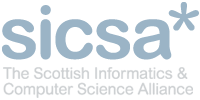by PWSAfrica Team
13 November 2018
 PWSAfrica’s goal is to empower scientists in Africa with the basic computer programming skills, which they would need to enhance their research. In August 2018, five computer scientists from the University of Glasgow set foot in Nigeria to run the first edition of this initiative. The workshop was certainly successful in training over 100 participants (a mix of postgraduates and undergraduates from the STEM departments) on the basics of Python programming. The day before the workshop started, we ran an “installation party” where students could bring their laptops and get help following installation instructions for Anaconda on their systems.
PWSAfrica’s goal is to empower scientists in Africa with the basic computer programming skills, which they would need to enhance their research. In August 2018, five computer scientists from the University of Glasgow set foot in Nigeria to run the first edition of this initiative. The workshop was certainly successful in training over 100 participants (a mix of postgraduates and undergraduates from the STEM departments) on the basics of Python programming. The day before the workshop started, we ran an “installation party” where students could bring their laptops and get help following installation instructions for Anaconda on their systems.
The two-week course was split into a few sections: Python fundamentals for the first half of the course (based initially on Dr. John Williamson’s materials for teaching Python at the University of Glasgow). Following this, a few days were spent on packages specifically useful for use in a scientific context, such as Numpy, Pandas and Matplotlib. Finally, participants completed group work where, for two days, they worked together to complete challenging tasks that would test their Python abilities. These were genuinely complex, and included producing animations of fireworks, writing language interpreters, solving mathematical modelling challenges and constructing matching algorithms.
An exciting part of the workshop — from our perspective — was how quickly we had to think to accommodate new information as we received it. Within the first day of teaching it quickly became apparent that the method of teaching we had assumed — providing content in Jupyter notebooks that could be worked through and assisted with by tutors in the room — did not work well with a room of students with mostly mathematical background! Their preference was to begin with a lecturing style, meaning we were constructing our content usually the night before it was delivered.
However, when we did teach with a lecturing style, we were hit with another surprise: students also enjoyed seeing code being run on a projector, and much preferred the tight feedback loop of writing code and seeing it execute to code written on a board, almost as mathematics. This wasn’t what we expected at all, and we found ourselves fitting a blend of the computing science teaching we were used to and the mathematics-style teaching that they were familiar with. This quick turnaround, where we would have to quickly find and implement solutions to problems, kept us on our toes in a satisfying and exciting way.
An aspect of the workshop that also stood out was the way our participants responded to being a part of the workshop. Their enthusiasm for the course was tremendous. Students were eager to ask questions and engage with the materials; the excited students would stay for their morning session, and after their lesson was finished, sit through the repeated lesson in the afternoon session so they could ask further questions. We had to put them in a separate room!
Events like PWSAfrica are only as successful as the people who attend, because ultimately, our “product” is their learning. For all our careful planning, the students’ willingness to engage determined whether our efforts were worth it! So, considering this, the students we happened to train were an absolute gift.
The workshop took place at the Department of Mathematics, University of Ibadan, in Nigeria. Our hosts were very kind and hospitable, and went to every effort imaginable to make sure our experience of Nigeria was the best it could possibly be. It was! We all have our own stories and memories that were taken from the trip. Personally, I still crave “Mr. Dennis’ Very Good Eggs”, have flashbacks every time I have to restart a Jupyter kernel, and reminisce on the heavy Nigerian rain cutting through muggy warm air. I loved the way it would kick up dust, and then angst from our students, who managed to spend most of their year free of precipitation altogether.
Which is to say: between our own incredible experiences, students with a voracious academic appetite, exciting technological challenges, and the eventual success of seeing students solve genuinely complex problems, we all consider PWSAfrica to be a roaring success: for the students’ experience; for the knowledge we impacted; and for our own incredible journey.
Needless to say, we’re excited for 2019!







